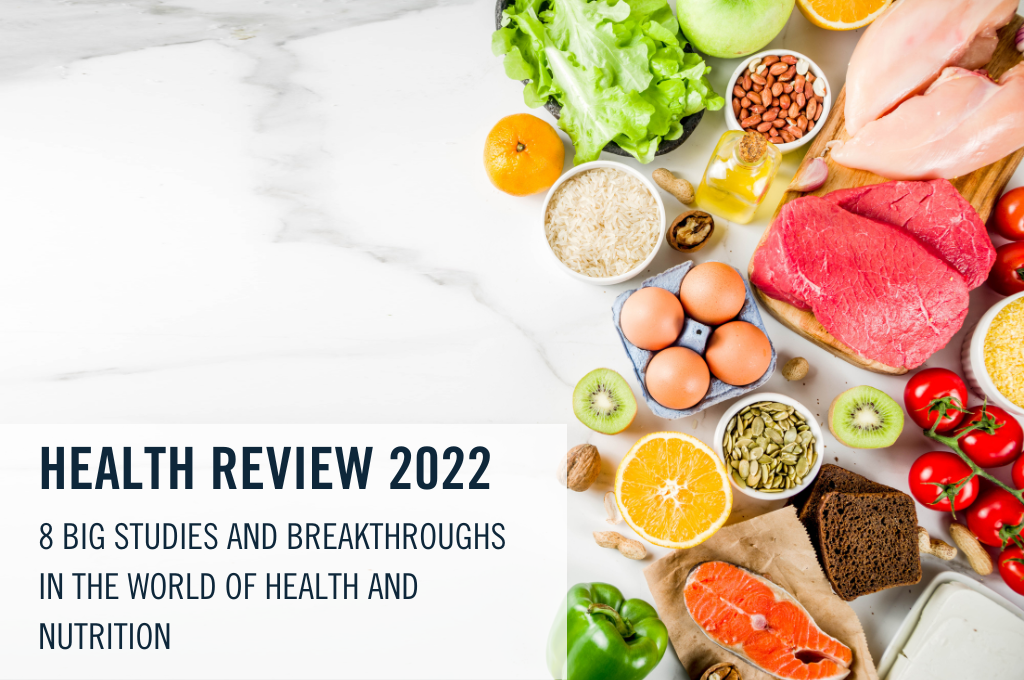8 Big Health Discoveries of 2022
28th November 2022 / Health / News
8 Big Health Discoveries of 2022
Jessica S

Health Review 2022
One of the things we love about nutrition is that it is an evolving area of science with great discoveries happening all the time. We can apply these to our everyday lives in the hope that we improve both our longevity and quality of life through health.
Here is our round-up of 2022’s most significant research and news stories, and how we can integrate them into our diets;
Chrononutrition
There has always been a two-sided debate over whether the time of day makes a difference in maintaining a healthy body weight. Classic scientific discourse has been the calories in vs calories out as the main factor, rather than timing, and often things like eating less in the evening or eating a large breakfast were dismissed as myths. However, a new study was published to show both are correct. While energy intake vs energy expenditure is crucial in weight management, notably when eating smaller or larger meals affects your appetite and blood sugar regulation, it is more about regulating how hungry you are throughout the day (1,2). You are less likely to overeat later in the day if you eat a larger (balanced) breakfast in the morning. It will also reduce the risk of obesity and diabetes.
Healthy diet on prescription
While many have known that preventative health through diet and lifestyle is the best medicine there is, it has not been part of mainstream medicine. That is changing, with fruit and veg on prescription beginning to roll out in pilot schemes (3), with the UK looking at this as part of a broader strategy to help reduce health inequalities. Other western countries are also using similar pilots to heal, prevent, manage and treat diseases such as type 2 diabetes (4).
Social media dietary advice
The meteoric rise of social media over the last 10-15 years has shown there can be great positives but also negatives. The area of health and well-being no doubt takes up a large amount of digital space. A survey showed that 47% of people take health and nutrition advice from social media (5). However, worryingly especially on TikTok aimed at younger users, much of this information was incorrect and misleading, promoted by unqualified individuals (6) and the platforms' algorithms promoting a toxic diet culture (7), contributing to disordered eating and body dissatisfaction.
Sweeteners are terrible for your health
Once promoted as a healthy alternative for those with a sweet tooth, artificial sweeteners have garnered significant controversy as synthetic food sources. Previous studies have shown that they can promote appetite and sugar cravings and contribute to higher body weight. However, this year saw a large-scale study, of more than 100,000 participants that linked their artificial sweetener intake (notable additives like aspartame, acesulfame potassium, and sucralose) to an increased risk of cardiovascular disease (8).
Artificial sweeteners are still present in many foods and beverage brands. However, the European Food Safety Authority, the World Health Organization, and other health agencies are re-evaluating their status.
If you want to know more about how to reduce sweeteners, check out the article we wrote earlier this year: https://linknutrition.com/blogs/news/artificial-sweeteners-are-most-likely-harmful-to-health.
Gut-brain axis
2022 saw a rise in Google searches for "gut health" and "gut-brain axis". Understanding that the microbes in our gut are much more than a healthy digestive process. They can influence our whole well-being, from mood health to hormonal balance and even our immunity.
This gut-brain axis is still a hot topic for research science too. This year's studies have shown how gut flora has the potential to help us cope with stress (9) and even how we socialise (10).
Nitrites in cured meats
Research from health advisory institutions like the WHO and leading universities in the UK and Europe has shown that nitrites in meat are carcinogenic (11). This research means they are linked not only to bowel cancer, but also to other cancers such as stomach, breast and prostate. However, 90% of UK bacon and many deli types of meat still use this as a preservative. France has moved forward with its legislation to phase out its use, and calls have been made to the UK government to do the same (12).
In the meantime, you can take action by seeking out 'nitrate-free' versions in your shopping trolley.
Nitrates from beetroot
Conversely, a related compound, but naturally occurring nitrate, found notably in beetroot, is anti-inflammatory and vasodilator and can therefore protect against cardiovascular disease. The British Heart Foundation (BHF) presented their research at the British Cardiovascular Society conference in Manchester suggesting, "that a daily glass of beetroot juice could be one way to get inorganic nitrate into our diet to help to interrupt harmful inflammation" (13).
Ultra-processed foods
A healthy diet is not a restricted one or one with many foods eliminated. It is a diet full of quality natural whole foods, including plenty of plant-based items. However, ultra-processed food does not only find its way into our diet by the clear routes of fast-food chains, ready meals or unhealthy snacks. We can also find them in the vegan section and free-from aisles. A large-scale study released this year, consisting of over 70,000 participants, showed a corresponding link between an ultra-processed diet and the increased risk of dementia (14). Further evidence linked it to depression, cardiovascular disease, and all-cause mortality.
Of course, in our modern lives, it can be hard to cook from scratch a full meal using fresh produce all the time. And convenience foods are not all bad, with many can be used positively as part of a healthy diet e.g. frozen veg or tinned beans/lentils. However, it is important to be wary of ultra-processed food packed with high levels of additives, lab-style production or unnaturally long shelf life.
Reference;
- https://www.cell.com/cell-metabolism/fulltext/S1550-4131(22)00344-8
- https://www.nature.com/articles/s41430-022-01128-z
- https://www.pulsetoday.co.uk/news/clinical-areas/obesity-and-nutrition/gps-in-london-start-prescribing-fruit-and-veg-in-250k-pilot/
- https://academic.oup.com/jn/article-abstract/152/11/2409/6671891
- https://www.sortlist.com/datahub/reports/the-power-of-influencers/
- https://www.eurekalert.org/news-releases/954886?adobe_mc=MCORGID%3D242B6472541199F70A4C98A6%2540AdobeOrg%7CTS%3D1668609911
- https://journals.plos.org/plosone/article?id=10.1371/journal.pone.0267997
- https://www.bmj.com/content/378/bmj-2022-071204
- https://www.nature.com/articles/s41380-022-01817-y
- https://journals.plos.org/plosbiology/article?id=10.1371/journal.pbio.3001838
- https://www.hsph.harvard.edu/nutritionsource/2015/11/03/report-says-eating-processed-meat-is-carcinogenic-understanding-the-findings/
- https://www.theguardian.com/food/2022/jul/08/nitrites-in-bacon-scientists-mps-call-for-uk-ban-cancer-fears
- https://www.ncbi.nlm.nih.gov/pmc/articles/PMC7045137/
- https://n.neurology.org/content/99/10/e1056
From The Blog
-

22nd December 2022 / Health / News
New Year Resolutions You Can Actually Keep
New Year resolutions to shed unhealthy habits and create healthy new ones are always popular. Often expectations are high, but January is when our systems can have the least in the tank leading to...
Read article -

30th November 2022 / Health / News
Taking Vitamin D This Winter
As the days get shorter and we spend more time inside, we should start to think about our vitamin D levels. Vitamin D deficiency in winter months is super common, but the symptoms often go unnot...
Read article -

26th September 2022 / Health / News
Artificial sweeteners are more likely to be harmful to your health
A large-scale study of over 100 thousand people over a 12 year period published in the BMJ has shown that artificial sweeteners have strong and probable causal links to heart (cardiovascular) disea...
Read article



